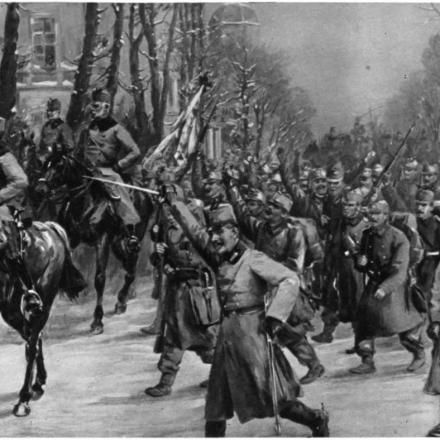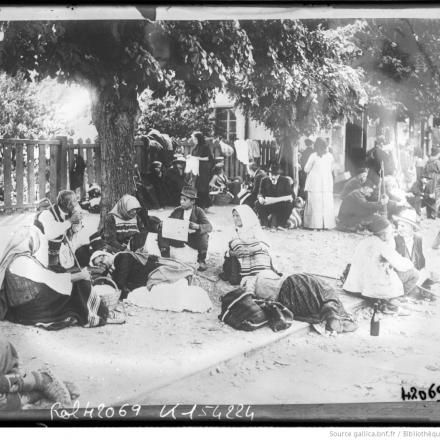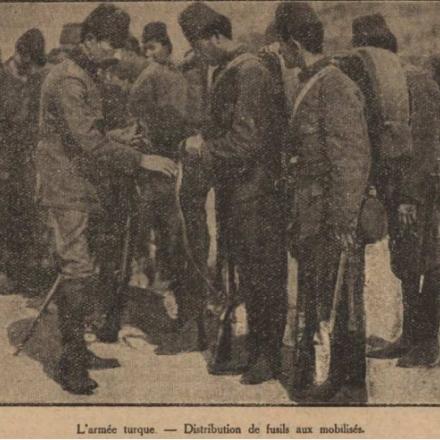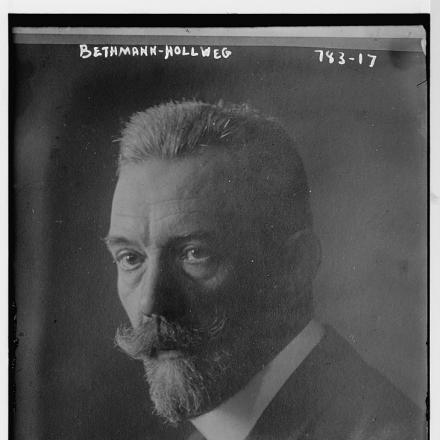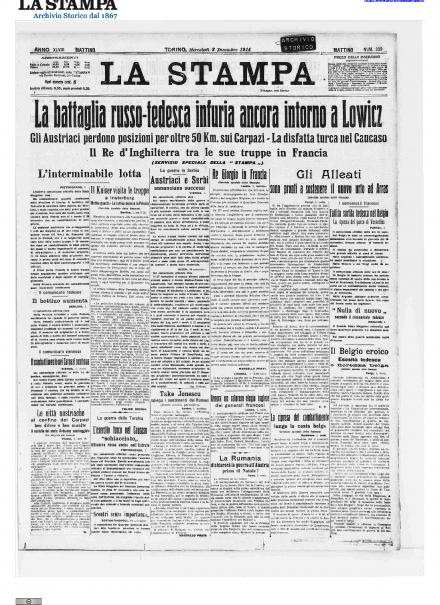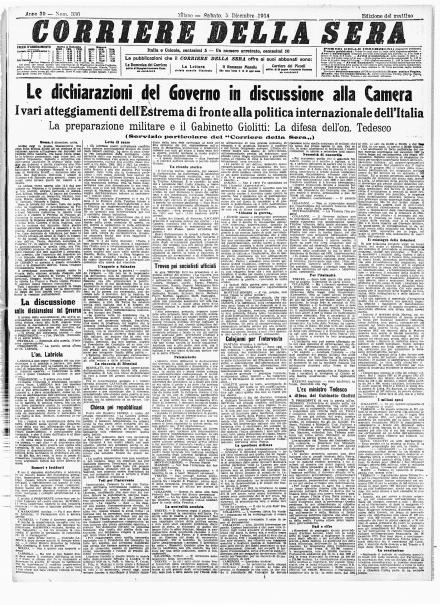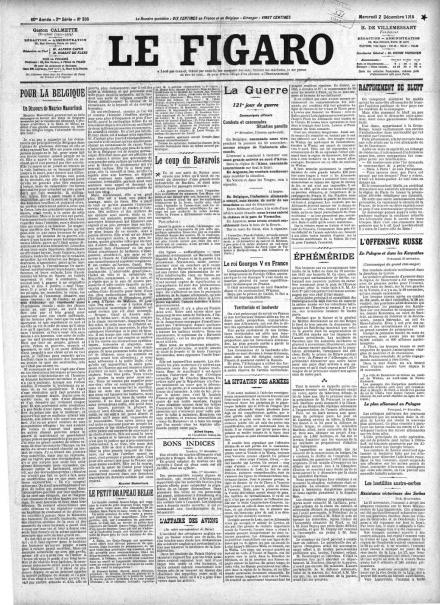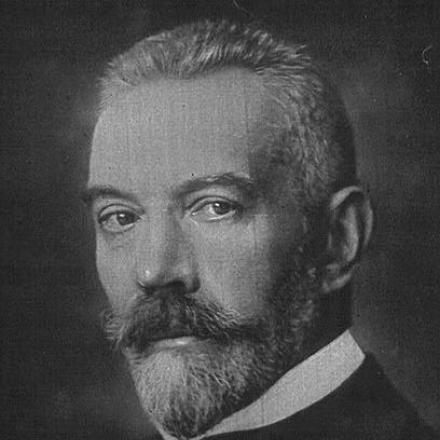Belgrado occupata dagli Asburgo
«Ci si abitua a tutto, anche alla guerra… specialmente se questa si combatte a una certa distanza. Qui a Vienna ormai ci siamo assuefatti, perlomeno a una certa atmosfera guerresca». Si apre così un articolo de La Stampa sulle condizioni di vita viennesi. Alcune ristrettezze ci sono: «Lo stridulo monosillabo ‘Krieg’ (guerra) ci suona continuamente all’orecchio». Il pane più economico è diventato il “Kriegsbrod”; chi risparmia i soldi del barbiere porta in giro una “Kriegsbart”, una barba di guerra. Gli esempi sono infiniti.
Anche nei moltissimi teatri della capitale il conflitto resta al centro dell’attenzione: la letteratura drammatica tedesca trabocca di opere militaresche. E molte altre stanno nascendo come funghi, cavalcando l’onda. Bene, ma non proprio benissimo: «Naturalmente, in queste guerre da palcoscenico, quella che finisce coll’essere sempre ammazzata spietatamente è l’arte». Vogliamo definirla una pietra tombale? Direi di sì.
Al fronte la situazione è diversa. Nei Balcani entrambi gli eserciti soffrono: gli austro-ungarici sono «esausti, ostacolati dal fango, dalla pioggia, dalla neve, privi dell’artiglieria pesante, che per difficoltà logistiche era rimasta indietro»; e i serbi hanno «sopportato sofferenze fisiche e morali forse anche maggiori ed erano quasi senza munizioni, demoralizzati e in preda a fenomeni di diserzione e ammutinamento sempre più diffusi».
Il 2 dicembre le forze asburgiche attraversano il Danubio e occupano Belgrado. A comandarle c’è il Generale Potiorek, testimone dell’attentato a Sarajevo e incapace di resistere al richiamo dell’ex capitale serba. Ma se dal punto di vista simbolico la presa di Belgrado è cruciale, la realtà sarà ben diversa: militarmente verrà considerato un errore strategico; le forze impiegate sarebbero state più utili altrove, dove i serbi concentravano le forze, dove si sarebbero decise le sorti dell’invasione.
Davide Sartori

GLI AVVENIMENTI
Politica e società
- Il Cancelliere tedesco von Bethmann-Hollweg, in un discorso al Reichstag, accusa l'Inghilterra di essere responsabile della guerra e giustifica con la necessità militare la violazione della neutralità del Belgio.
- Irlanda: sequestrati giornali sediziosi a Dublino.
Fronte occidentale
- I tedeschi tentano di attraversare sulle zattere l’Yser a sud di Diksmuide, ma vengono duramente respinti.
- I francesi occupano Lesménils (Moselle) e Burnhaupt (Alsazia).
Fronte orientale
- Ungheria: i russi occupano Bartfeld (oggi Bardejov, in Slovacchia).
Fronte meridionale
- Nel 66° anniversario dell'assunzione al trono dell'Imperatore Francesco Giuseppe, le forze austro-ungariche attraversano il Danubio e occupano Belgrado.
- I serbi cominciano una controffensiva nella regione di Suvobor.
Parole d'epoca
Herr Von Bethmann Hollweg, cancelliere tedesco
Intervento al Reichstag, December 2, 1914
GREAT BRITAIN TO BLAME FOR THE WAR The Emperor, who is absent with the Army, has charged me to transmit his best wishes and cordial greetings to the German Reichstag, with whom he is known to be united till death in the stress of danger and in the common concern for the weal of the Fatherland. Our first thought goes out to the Kaiser and the Army and Navy — our soldiers who are lighting for the honour and greatness of the Empire. Full of pride and unshakeable confidence, we look to the in and to our Austro-Hungarian comrades in arms, who are firmly united to us, to fight great battles with brilliant bravery. Turkey as an Ally Our most recent ally in battle, who has been obliged to join us, is the Ottoman Empire, which knows well that with the destruction of the German Empire it, too, would lose its national right to control its own destiny. As our enemies have formed a powerful coalition against us they will, I hope, find that the arm of our brave allies reaches the weak spots in their world-position. On August 4 the Reichstag expressed the firm resolution of the whole people to undertake the war which had
been forced upon them, and to defend their independence to the utmost. Since then great deeds have been accomplished. The incomparable gallantry of our troops has carried the war into the enemy's country. There we still stand firm and can regard the future with every confidence; but the enemy's resistance is not broken. We are not yet at the end of our sacrifices. The nation will continue to support those sacrifices with the same heroism as hitherto, for we must and will fight to a successful end our defensive war for right and freedom. We will then remember how our defenceless compatriots in hostile countries were maltreated in a manner which is a disgrace to all civilization. The world must learn that no one can hurt a hair on the head of a German subject with impunity. Russia Apparently Responsible for the War
It is evident to us who is responsible for this, the greatest of all wars. The apparent responsibility falls on those in Russia who ordered and carried out the mobilization of the Russian Army. The real responsibility, however, falls on the British Government. Britain the Real Aggressor The Cabinet in London could have made the war impossible if it had without ambiguity declared at Petrograd that Great Britain would not allow a Continental war to develop from the Austro-Serbian conflict. Such a declaration would also have obliged France to take energetic measures to restrain Russia from undertaking war-like operations. Then our action as mediators between Petrograd and Vienna would have been successful, and there would have been no war. But Great Britain did not act thus. Great Britain was aware of the bellicose machinations of the partly irresponsible but powerful group around the Tsar. She saw how the ball was rolling, but placed no obstacle in its path. In spite of all its assurances of peace, London informed Petrograd that Great Britain was on the side of France, and consequently on the side of Russia. Britain's Object The Cabinet of London allowed this monstrous world-wide war to come about, hoping, with the help of the Entente, to destroy the vitality of England's greatest European competitor on the markets of the world. Therefore England and Russia have before God and men the responsibility for the catastrophe which has fallen upon Europe. Belgian neutrality, which England pretended to defend, was nothing but a disguise. On the evening of August 2 we informed Brussels that we were obliged, in the interests of self-defence and in consequence of the war plans of France, which were known to us, to march through Belgium, but already on the afternoon of the same day, August 2, before any thing of our démarche in Brussells could have been known in London, the British Government promised France unconditional assistance in case the German Fleet should attack the French coast. Nothing was said about Belgian neutrality. How can England maintain that she drew the sword because we violated Belgian neutrality? How could the British statesmen, whose past is well known, speak at all of Belgian neutrality? When, on August 4, I spoke of the wrong which we were oommitting with our march into Belgium, it was not yet established whether the Belgian Government at the last hour would not desire to spare the country and retire under protest to Antwerp. For military reasons the possibility of such a development on August 4 must be left blank in all circumstances. The 'Guilt' of Belgium As to the guilt of the Belgian Government, many indications were already known at that time, but there were no positive and written proofs. Now, however, that it is demonstrated, by documents found in Brussels, how the Belgians surrendered their neutrality to England, the entire world knows two facts. One is that when our troops, on the night of August 3-4, entered Belgian territory, they were on the ground of a State which had given up its neutrality long ago. The other is:not for the sake of the neutrality of Belgium, which she had herself undermined, did England declare war on us, but because she believed that she would be able to master us with the help of two great Continental Powers. Britain at War since August 2 Since August 2, since her promise, to assist France, England was no longer neutral and was actually at war with us, and the argument that the declaration of war was a sequel to the violation of Belgian neutrality is nothing but a piece of play-acting performed to mystify the English people and neutral States. Now that the Anglo-Belgian war plans are unveiled in their smallest details, the policy of British statesmen is branded before the tribunal of history for all times. But British diplomacy went further. At England's request Japan snatches away heroic Kiaochau and violates the neutrality of China. Has England interfered in this violation of neutrality? Has England shown a care for neutral States in this case? When, five years ago, I was called to office, the Triple Alliance was opposed by a firmly united Entente, England's work was designed to serve the known principle of the balance of power, which means in plain German that the principle, followed for centuries by British policy and directed against the strongest continental Power, should find its strongest tool in the Triple Entente. This proves from the beginning the aggressive character of the Entente towards the plainly defensive tendencies of the Triple Alliance. The Germ of the Explosion This was the germ of the forcible explosion. German policy was obliged to try to avert the danger of war by an understanding with the individual Powers of the Entente. At the same time, she was obliged to strengthen her defensive forces so that she should be prepared if war should come all the same. We did both. In France we always encountered ideas of revanche fed by ambitious politicians. With Russia some agreements were concluded ; but Russia's firm alliance with France, her antagonism to us and our ally Austria-Hungary, her Panslavistic desire for power, her artificial hatred for Germany, made it impossible to conclude an agreement which, in the case of a political crisis, would exclude the danger of war. British Insular Intellect England was comparatively free. Here the best attempt at an understanding could be made which would have effectively guaranteed the peace of the world. I acted accordingly. The way was narrow, which I knew well. For decades the British insular intellect has been evolving the political principle, the dogma that the arbitrament of the world is due to England, which she can only maintain by undisputed supremacy on sea and the much-quoted balance of power on the Continent. I never hoped to break the old English principle by persuasion. What I believed possible was that the growing power of Germany and the growing danger of war could compel England to perceive that this old principle was untenable and unpractical, and that a peaceable arrangement with Germany was preferable; but that dogma always paralysed the possibility of an understanding. The Rapprochement of 1911 After the crisis of 1911, public opinion forced British rulers to a rapprochement towards Germany. By wearisome work an understanding was finally attained indifferent disputed questions of economical interest which related to Africa and Asia Minor. This understanding should have diminished possible political friction if the free development of our strength were not impeded. Both peoples had sufficient space to measure their strength in peaceful competition. This was the principle always upheld by German policy. But while we were negotiating, England was always thinking of strengthening her relations with Russia and France. The decisive factor was that more binding military agreements for the case eventually of a continental war were concluded outside the political sphere. Britain's Secret Negotiations England negotiated, if possible, secretly. If anything leaked through of importance, it was diminished in Press and Parliament. It could not be concealed from us. The whole situation was as follows: England was willing to come to an understanding with us in individual questions, but the first principle always was that Germany's free development of strength must be checked by the balance of power. We did not fail to warn the British Government. As recently as the beginning of July I notified the British Government that we knew of the secret naval negotiations with Russia concerning the naval convention. I pointed out the serious danger which British policy meant for the peace of the world. A fortnight later what I predicted occurred. When war had broken out England dropped her disguise. She loudly announced that she would fight till Germany was conquered in an economical and military sense. We have only one answer—Germany cannot be destroyed. As her military strength has stood the test, so has the financial strength of Germany. Japan joined our enemies from a desire to seize as booty the monument of German culture in the Far East. On the other hand, we have found an ally in Turkey, as all the Moslem peoples want to throw off the English yoke and shatter the foundations of England's colonial power. Under the banner of our Army and the flag of our Fleet we shall conquer
